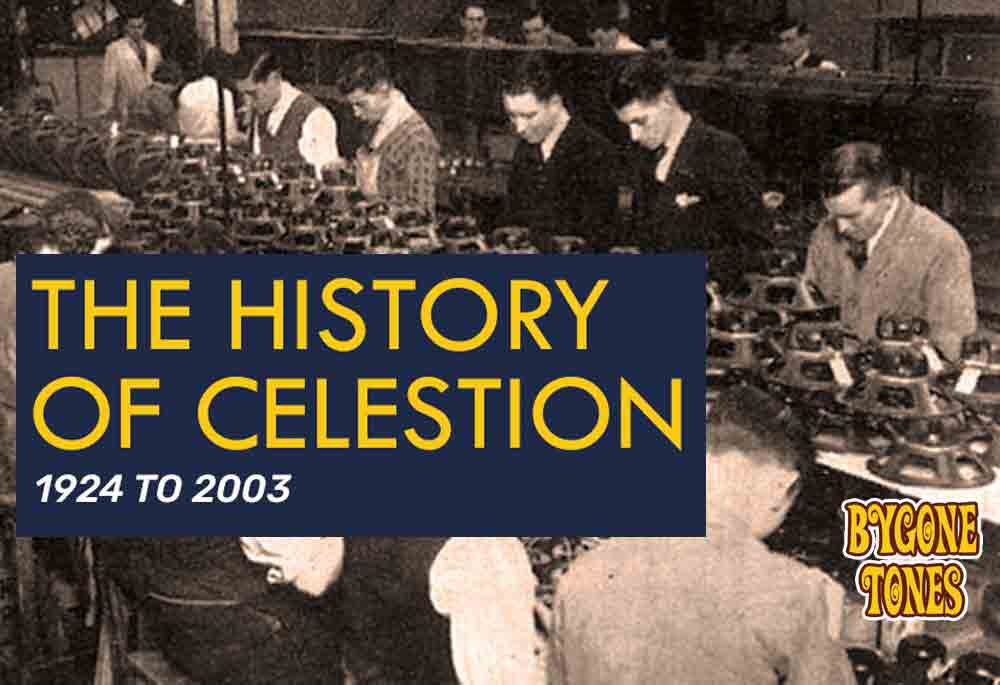
Celestion has been an iconic brand for guitarists since the 1960’s. However their roots go much deeper than this, starting back in the 1920’s with early radio speakers. The following text detailing Celestion History has been taken and adapted from a Celestion website article dated Dec 2003. Illustrated with photos taken from the web and Celestion’s facebook page.
Early Beginnings
In 1924 Cyril French set up a small business to manufacture loudspeakers, helping Eric Mackintosh improve his invention – one of the earliest cone loudspeakers.
French and two of his brothers, Leonard and Edgar, created ‘The Electrical Manufacturing and Plating Company’ at 29 High Street, Hampton Wick.
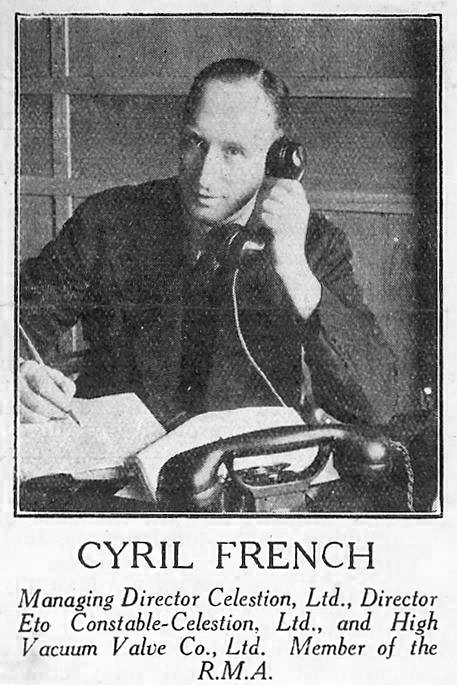
Amidst great excitement, French and Mackintosh perfected the loudspeaker design, and patents were issued for their ‘free-vibrating edge’, and ‘clamped edge’ designs.
The Celestion loud speaker was launched early in 1925 and was favourably reviewed by ‘Popular Wireless’ as “a high-class instrument capable of high-class perfomances”.
In 1927 – The Celestion Radio Co and Celestion Ltd were formed; The company’s motto, and for many years to follow, was “The Very Soul of Music”.
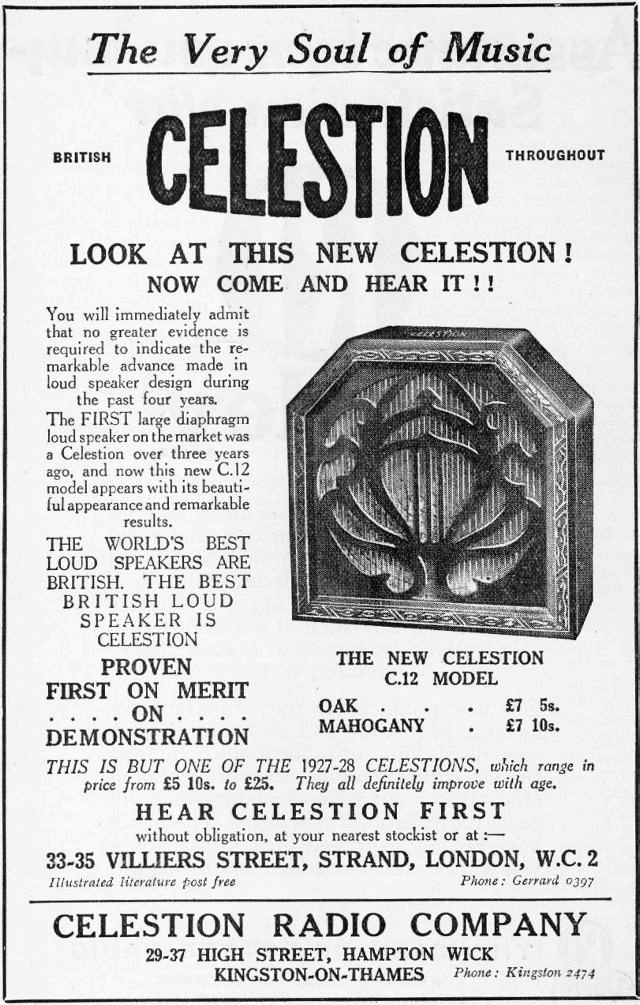
Through the late 1920’s Celestion enjoyed a burgeoning trade, and in 1929 moved to larger scale premises at 145 London Road, Kingston-upon-Thames.
The 1930’s
Celestion was moving in both the mechanical and electrical spheres of the home entertainment industry, offering luxurious gramophone models. They even issued a separate catalogue for ships, which included gramophones, band repeater equipment and reproducers.
French and Eric Mackintosh both left Celestion in the early 1930’s. The reason for this is not clear, but there is evidence to suggest that Cyril French was a hard taskmaster.
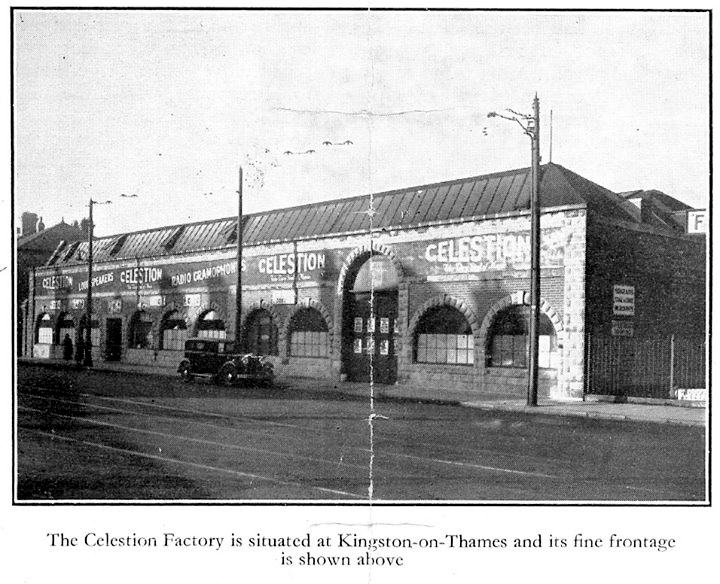
In 1935 the worldwide recession hit Celestion badly, and the first ‘boom’ era came to an abrupt end. Cyril French resigned from the board of Celestion Ltd and returned to the old site at Hampton Wick to operate as sole wholesale and retail distributor of Celestion products in Great Britain
The market for speakers shifted from the large separate units to small speakers fitted inside the radios themselves.
The British Rola Company, an offshoot of the Rola Company of Cleveland, Ohio, USA, had been making very similar products at Minerva Road, Park Royal, London NW10 since 1934.
The 1940s
During World War 2 (Sept 1939 to Sept 1945), both Celestion and British Rola were restricted to the manufacture of one type of loudspeaker, the utility “W” type. British Rola made theirs at Ferry Works, Summer Road, Thames Ditton, while Celestion made theirs at the Kingston factory.
The British Rola factory at Thames Ditton was virtually self-sufficient, producing cones, suspensions, voice coils and transformers ‘in-house’.
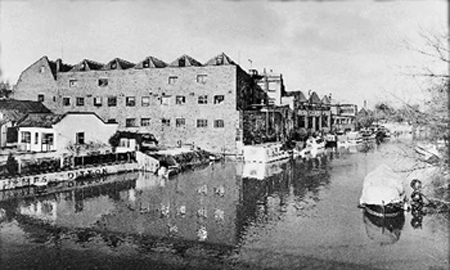
After the war, the hard winter and fuel crisis of 1947 caused havoc and production was incredibly slow at both companies.
British Rola acquired Celestion Ltd in April 1947, and together they covered practically the entire export loudspeaker business.
During July 1948, Celestion ceased production at Kingston-upon-Thames, and production machinery and personnel moved to Thames Ditton as a consolidation of the two companies. The company title became Rola Celestion Ltd, and ‘Celestion’ was adopted and registered as the trade mark for the company’s product.
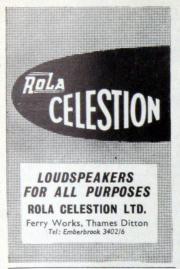
As the market for television grew, so did the need for speakers and the Thames Ditton production lines were fully engaged meeting the manufacturers’ deadlines.
In 1949 another change in fortune came about when Rola Celestion was acquired by Truvox, a company based in Wembley and well known for its Public Address loudspeakers and systems.
The new Company was now owned and chaired by Mr.D.D.Prenn and the Head Office situated at Mount Street, London. Technical Director Arthur Young was resident at Thames Ditton. This brought the Public Address loudspeaker systems into the Celestion range, where they were further developed.
The 1950s
During this time a number of diverse alternate production lines were tried, including a pre-Christmas production of toy ducks! A more logical diversion was that of a moving coil microphone. Loudspeaker production at this time was about 30,000 to 35,000 units per week.
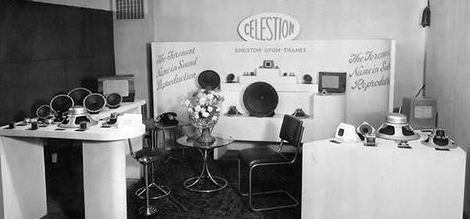
This era gave birth to the stereophonic long playing record and as the taste for high fidelity increased, so did the demand for even better sound and stereo.
The 1960s
The burgeoning market for live, amplified music gave rise to the enormous success of the G12, which eventually achieved fame as the guitar loudspeaker used in the Vox AC30 used by the Beatles and many of their contemporaries.
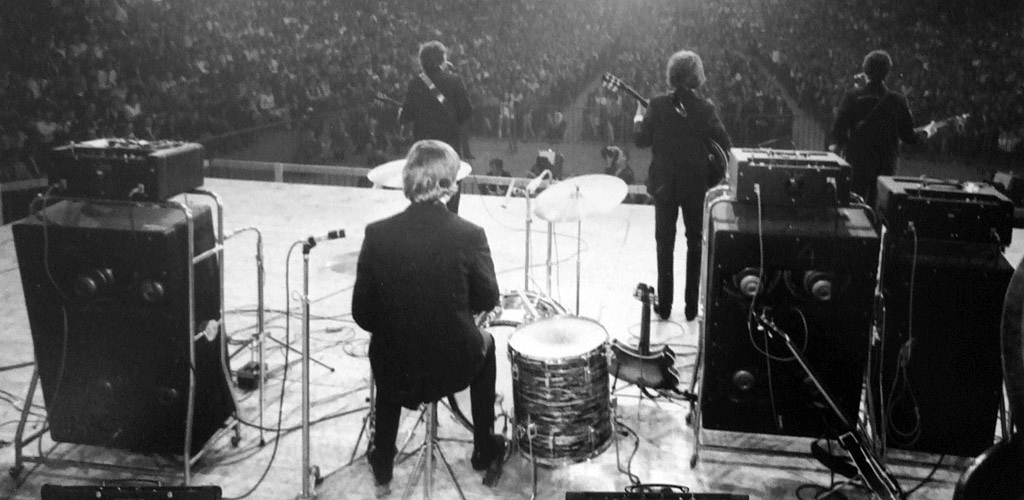
With their ears continually to the ground and their eyes on the market, the Thames Ditton design and engineering staff produced in 1964 what was to be the first of many notable Celestion hi-fi loudspeaker designs.
Utilising the name of its birthplace, the Ditton 10 was launched at a critical time when it satisfied overnight a demand that hitherto had been frustrated. Offering the best possible audio quality from its bookshelf size, it was highly commended for its bass response. A quality that the pundits had always maintained could only be achieved with a large and heavy enclosure.
The Ditton 15 made its appearance during 1966, and was eagerly sought after by the now stereo conscious public. It became the biggest selling bookshelf loudspeaker of its time.
In 1968, as the demand for Ditton loudspeakers mounted, production became a problem at the Thames Ditton factory and it was decided that a new location at Foxhall Road, Ipswich was required as an expansion of the present site.
New buildings were constructed, existing ones modified and the nucleus of a work force recruited using ex-Thames Ditton supervisory staff to train the new employees. Production began in Ipswich in late December 1968.
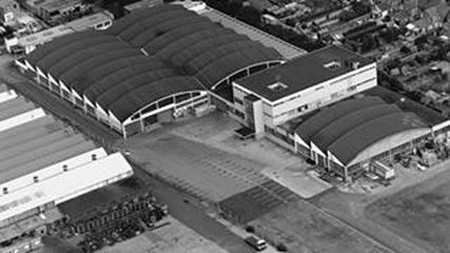
First into manufacture at the new Ditton Works, Ipswich, so named to perpetuate the original site, were the 12″ Power loudspeakers of the G12 type. In the early days supply and distribution raised many problems as a vehicle was despatched early each morning from Ipswich to make the 90 mile run through London to Thames Ditton, carrying the previous day’s production. It then loaded and returned by the same route, carrying back essential components for the next day’s production, enabling the supervisor, charge hand and twelve ladies to meet their schedule.
As the weeks passed the interior of the Ipswich works began to house more and more sophisticated production machinery and more staff were engaged to operate the lines. They were now able to relieve the problems at Thames Ditton in the supply of domestic speakers to the manufacturers.
The 1970s
In 1970 Rola Celestion was brought together with a publicly-quoted clothing company and the holding company created was named Celestion Industries plc.
Due to increasing demand for high fidelity stereo cabinet systems, further expansion took place with the acquisition of a modern assembly plant on the Hadleigh Road Trading Estate on the other side of Ipswich.
Ditton Works now concentrated on the manufacture in all aspects of hi-fi component units, Power Range loudspeakers and units in the Public Address sector.
1974 – With the surge of interest in hi-fi from the general public, staffing levels reached a peak in January 1974 with a total of 907 employees at the two sites in Ipswich and at Thames Ditton, some of these working night shifts. Distribution was now wholly carried out from Ipswich by a new fleet of company vehicles. The Thames Ditton factory was gradually run down, eventually closing altogether in 1975.
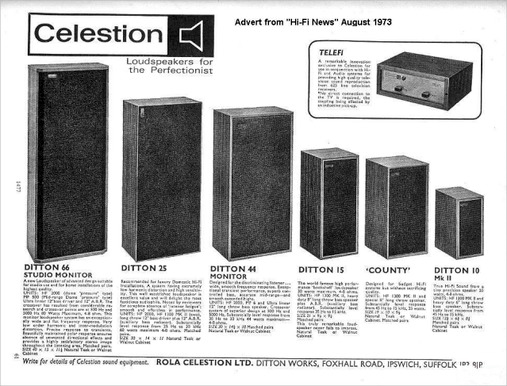
1977 – On 20th January 1977 Chairman Mr.D.D.Prenn announced the creation of overseas subsidiaries in France (September 1976), West Germany (October 1976) and U.S.A. (February 1977).
1979 – The increasingly international nature of the company’s business led in 1979 to the adoption of the name Celestion International as a corporate identity for the parent company and all major overseas subsidiaries.
The 1980s
In 1980, Celestion’s continued investment in technology bore fruit behind the scenes of loudspeaker design. An instrument was developed that uses laser light to scan a diaphragm and produce moving ‘microscope’ pictures on a computer screen. This system taught Celestion’s designers hitherto unknown subtleties of loudspeaker design, many of which remain trade secrets to this day.
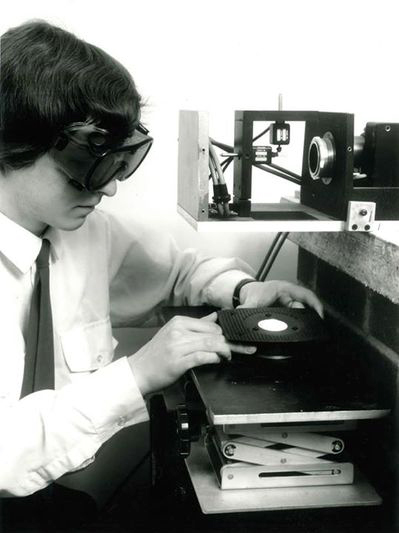
The Hadleigh Road site had been closed down in the early 1980s and resources concentrated at Foxhall Road.
In 1984 – the Sidewinder range of guitar speakers were unveiled. These were endowed with a special edgewound aluminium voice coil – a process developed to maximise the ratio of motor strength to mass which resulted in very high efficiency designs.
The 1990s
In 1992 Celestion International Ltd. was sold, as a separate entity from the clothing division, to Kinergetics Holdings (UK) Ltd. A holding company whose majority shareholder is Gold Peak of Hong Kong.
The 2000s
2003 – the Celestion and KEF manufacturing operations are united under the banner of KH Manufacturing Ltd. While Celestion International Limited continues the tradition begun by Cyril French and Eric Mackintosh over 70 years ago. The research, development, sales and marketing of loudspeakers of the highest quality.

I have a pair of Celestion Matchless Special Design 30-watt 8 Ohm speakers. Are these sought after? What is the overall opinion of their tone and capability? How do they stack up against Greenbacks or other models? Thanks for your time!
Author
Hi Greg, that is not a speaker I am familiar with sorry. My experience is with vintage speakers, mostly pre-1980. Although they are likely a G12H speaker specially voiced for Matchless amplifiers. If you email Celestion directly with the T model number of the speaker they should be able to help you out. They have every speaker model on file there. Hope that helps, Brian.
hi mate i have a marshall silver jubilee combo from 1987 when i bought it someone has changed the speakers that were the v30s celestion to greenbacks made in england has the cone 6402 and the codon the chasis is ck t1220 .
very clean speakers and sound amazing in that amp.
my question is are these speakerfrom the 70s they are g12m .??your help is appreciated.
Author
Hi, difficult to say what they are without seeing them. Can you email me some photos? The 6402 cone was used in the 1990’s on the G12M, so 1970’s is too early for those. They could be 1977 blackbacks reconed or more recent greenbacks from 2000.
Brian.
Hi folks. Loved the article. Very interesting! I love Celestion and have a surround sound setup that is all Celestion with the exception of the sub. It is the “A” Series. With A2’s and a Celestion Center Channel (A1C I believe) , A1’s on the side (stand mounted version of the floor standing A2) and a pair of Celestion di-poles in the rear (A1S?). This was prior to KEF’s purchase. I love them. All in beautiful cherry. Very heavy and solid. Sound is magnificent. Detailed. I occasionally use the A1’s on stands with a vacuum tube nearfield stereo setup with a VPI turntable and they excel. These speakers are over 20 years old and, even taking inflation into account, you’d be hard press to even get near the sound quality for the $ invested. Should you bump into a pair of Celestion A’s, of any size (the large floor stander is the A3) I’d certainly recommend you investigate!
Celestion survived but Goddmans didn’t
I have an identical pair of Celestion speakers one of which I opened and found 2 signatures # and dates. First in the cone which has a spiral wire wound to the centre, signature and a date saying reconed which I shall look up again (I think 1929) and a different signature and date (when originally made I expect). These speakers have wooden feet and a knob on the rear which moves a magnet in and out of a coil that is connected to 2 terminals on the back. I take it this was for volume? I purchase the first for 2s and 6 pence (12 1/2 pence in todays money)from Acle Sale Norfolk in 1966. I have seen parts of similar speakers in the reception of Celestion when it was in Ipswich as I visited to buy 4 18″ drivers and spoke to a design engineer as the factory was in shutdown for holiday. There were wooden cases and coils with and without cones but he said they did not have any complete speakers of the design. Must take some photographs and I can send them.
Author
Hi Christopher, great info. Thanks for sharing. Yes would be good to see the photos. You can email them to me at info@bygonetones.com
regards, Brian.
Do you know where I can find any information regarding Celestion E5 speakers?
Author
Hi, I am not very familiar with hifi range of Celestion speakers sorry. I mainly deal with guitar speakers. All I can suggest is google, or maybe someone else will respond here.
Sorry I can’t be more help.
Brian.
Brian, I have just uncovered two Celestion S12-150 speakers in my attic and I am not sure if they are the guitar or bass version, I think the latter maybe. The code on the label says 8 Ohms T3865 can you shed any light this. Are these good speakers, they appear to be in good condition.
Mike
Author
Hi Mike, T3865 is the bass version of the sidewinder speaker. If you look at the T-number list it is shown there. As to whether they are good speakers, I have never actually tried them to be honest but they were some of the first to use the laser design technology mentioned in this history article. So should sound pretty good in theory. Hope that helps, Brian.
I’ve got a 35 watt guitar amp and am using a Celestion 15″ Fullback that sounds excellent, but would like to have a Celestion 15″ better matched to the 35 watt power rating of my amp. Does/did Celestion make anything like I’m looking for? Thanks, Jean
Author
Hi Jean, yes they made some 15″ greenback models rated at 50 watts. The G15M and G15C. When using vintage speakers you should try and allow for twice the power handling of the amp to be on the safe side so that you don’t damage the speaker, but 50 watts would be sensible with a 35 watt amp. Hope that helps, Brian.
When were cs5 made , do you know the technical specs?
Author
Hi Marlin, hifi speakers are not my area of expertise sorry, the website is mainly about guitar speakers. If you contact Celestion directly Im sure they would be able to tell you more about them.
regards, Brian.
I have a pair of Ditton 33s. It’s time for the capacitors in the crossover to be renewed, do Celestion offer any kind of reconditioning service ?
Author
Hi Mark, not my area of knowledge sorry, ask me about guitar speakers, but I’m clueless on the hifi stuff. Best to email Celestion directly: drdecibel@Celestion.com
regards, Brian.
Cheers, I’ll let you know how I get on
I heard back – he stays it’s not a service they offer 🙁
My father worked for Celestion Ipswich for 28 years, until he passed in 1998.
We passed his Ditton speakers on to a collector, but I still have his SL6 speakers in the loft.
Email me on sam555085@gmail.com if you want to sell the speakers i would like to buy them .thanks lee.
Sam